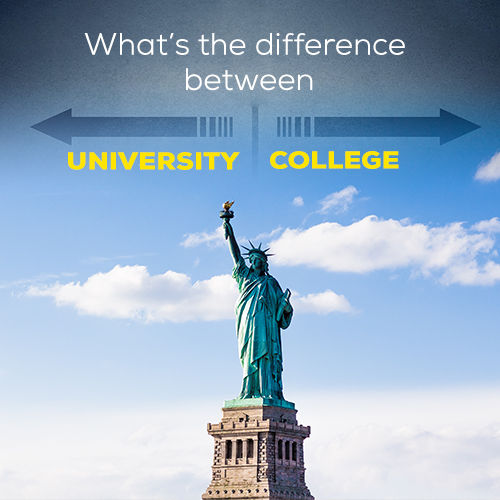
What’s the difference between Colleges and Universities in the USA?
We always strive for excellence when it comes to education. The distinction between a university and a college might be difficult to draw. The phrases “college” and “university” are frequently used synonymously in the United States, however, there are some differences between the two, even though their meanings might change depending on the situation and place.
1. Size and Complexity:
Typically, a college is a smaller institution that focuses primarily on undergraduate education, A university is generally a larger and more complex institution that offers a broader range of academic programs, including undergraduate, graduate, and often doctoral degrees.
2. Degree Programs:
College: Colleges often emphasize undergraduate education and may offer a limited number of graduate programs or none at all. It may offer associate’s and bachelor’s degrees but might not offer advanced degrees (such as master’s or doctoral degrees) in all fields
University: Universities offer a wider variety of degree programs, including undergraduate, graduate, and doctoral degrees, spanning various fields of study. Universities tend to have multiple colleges or schools within them, each specializing in different fields of study.
3. Research Focus:
College: While some colleges may engage in research activities, their primary focus is often on teaching and undergraduate education.
University: Universities generally place a greater emphasis on research and may have extensive research facilities, faculty members engaged in research projects, and a commitment to advancing knowledge in various fields.
4. Academic Hierarchy:
College: Colleges might be part of a larger university or function as independent institutions. They may be focused on specific disciplines or fields.
University: Universities typically encompass multiple colleges or schools, each specializing in different academic disciplines. For example, a university might have a College of Arts and Sciences, a College of Engineering, a College of Business, etc.
5. Prestige and Recognition:
College: Some colleges are highly regarded for their quality of education and specialized programs.
University: The term “university” is often associated with larger and more comprehensive institutions, which can contribute to a perception of higher prestige.
6. Campus Culture:
College: Due to their smaller size, colleges might offer a more close-knit and personalized learning environment.
University: Universities often have a more diverse and dynamic campus culture, with a larger student population and a broader range of extracurricular activities.
It’s important to note that the distinctions between colleges and universities can vary by region and individual institution. Some colleges have evolved into universities over time, and some universities might have a strong focus on undergraduate education. When considering educational options, it’s essential to research each institution’s specific offerings, programs, and strengths, rather than relying solely on the terms “college” or “university.”
Ms. Sanjana Sanzgiri
Senior Counselor



